英语中的倒装句
英语语法 倒装句有哪些常见的类型
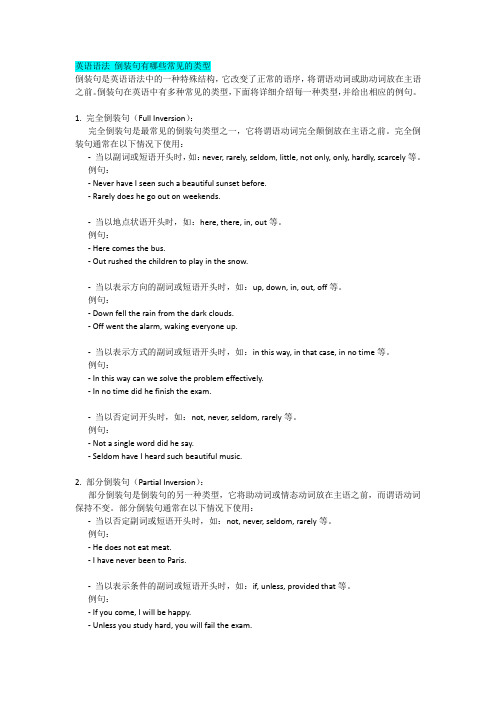
英语语法倒装句有哪些常见的类型倒装句是英语语法中的一种特殊结构,它改变了正常的语序,将谓语动词或助动词放在主语之前。
倒装句在英语中有多种常见的类型,下面将详细介绍每一种类型,并给出相应的例句。
1. 完全倒装句(Full Inversion):完全倒装句是最常见的倒装句类型之一,它将谓语动词完全颠倒放在主语之前。
完全倒装句通常在以下情况下使用:-当以副词或短语开头时,如:never, rarely, seldom, little, not only, only, hardly, scarcely等。
例句:- Never have I seen such a beautiful sunset before.- Rarely does he go out on weekends.-当以地点状语开头时,如:here, there, in, out等。
例句:- Here comes the bus.- Out rushed the children to play in the snow.-当以表示方向的副词或短语开头时,如:up, down, in, out, off等。
例句:- Down fell the rain from the dark clouds.- Off went the alarm, waking everyone up.-当以表示方式的副词或短语开头时,如:in this way, in that case, in no time等。
例句:- In this way can we solve the problem effectively.- In no time did he finish the exam.-当以否定词开头时,如:not, never, seldom, rarely等。
例句:- Not a single word did he say.- Seldom have I heard such beautiful music.2. 部分倒装句(Partial Inversion):部分倒装句是倒装句的另一种类型,它将助动词或情态动词放在主语之前,而谓语动词保持不变。
英语倒装句12种类型及例句
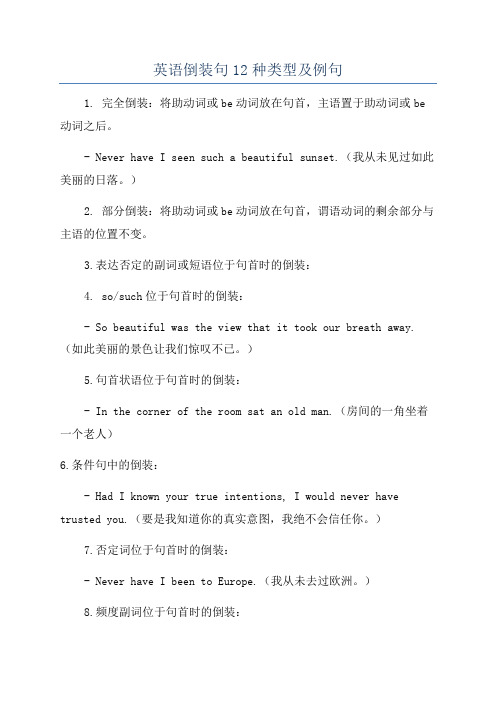
英语倒装句12种类型及例句1. 完全倒装:将助动词或be动词放在句首,主语置于助动词或be 动词之后。
- Never have I seen such a beautiful sunset.(我从未见过如此美丽的日落。
)2. 部分倒装:将助动词或be动词放在句首,谓语动词的剩余部分与主语的位置不变。
3.表达否定的副词或短语位于句首时的倒装:4. so/such位于句首时的倒装:- So beautiful was the view that it took our breath away.(如此美丽的景色让我们惊叹不已。
)5.句首状语位于句首时的倒装:- In the corner of the room sat an old man.(房间的一角坐着一个老人)6.条件句中的倒装:- Had I known your true intentions, I would never have trusted you.(要是我知道你的真实意图,我绝不会信任你。
)7.否定词位于句首时的倒装:- Never have I been to Europe.(我从未去过欧洲。
)8.频度副词位于句首时的倒装:- Rarely do we see such dedication.(我们很少见到如此的奉献精神。
)9.祈使句或祈使句部分的倒装:- Stand up!(站起来!)- Be quiet, please.(请安静。
)10. only位于句首时的倒装:- Only by working hard can you achieve your goals.(只有通过努力工作,你才能实现目标。
)11.地点状语置于句首时的倒装:- In the garden were beautiful flowers.(花园里有美丽的花朵。
)12.宾语置于句首时的倒装:- A love like this I have never felt before.(我之前从未感受过如此的爱。
英语倒装句(最全面_最简洁)
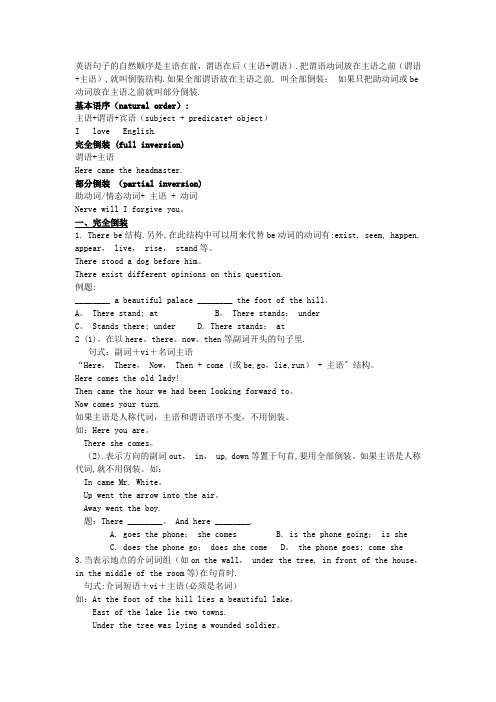
英语句子的自然顺序是主语在前,谓语在后(主语+谓语).把谓语动词放在主语之前(谓语+主语),就叫倒装结构.如果全部谓语放在主语之前, 叫全部倒装;如果只把助动词或be 动词放在主语之前就叫部分倒装.基本语序(natural order):主语+谓语+宾语(subject + predicate+ object)I love English.完全倒装 (full inversion)谓语+主语Here came the headmaster.部分倒装(partial inversion)助动词/情态动词+ 主语 + 动词Nerve will I forgive you。
一、完全倒装1. There be结构.另外,在此结构中可以用来代替be动词的动词有:exist, seem, happen, appear, live, rise, stand等。
There stood a dog before him。
There exist different opinions on this question.例题:________ a beautiful palace ________ the foot of the hill。
A。
There stand; at B。
There stands; underC。
Stands there; under D. There stands; at2 (1)。
在以here、there、now、then等副词开头的句子里.句式:副词+vi+名词主语“Here, There, Now, Then + come (或be,go,lie,run) + 主语" 结构。
Here comes the old lady!Then came the hour we had been looking forward to。
Now comes your turn.如果主语是人称代词,主语和谓语语序不变,不用倒装。
英语倒装句12种类型及例句
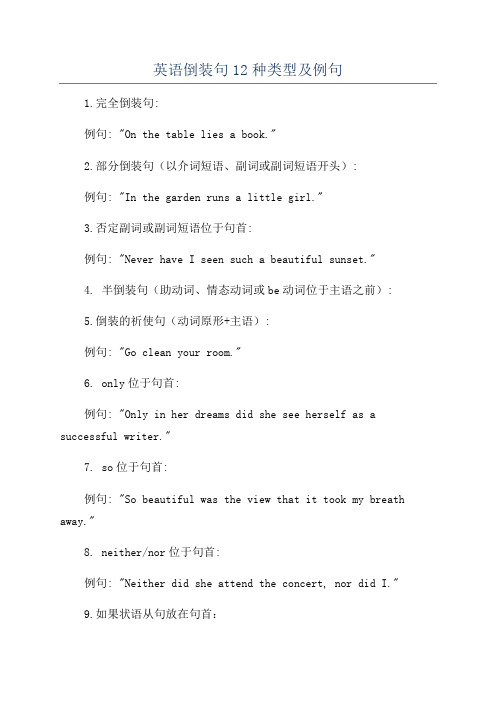
英语倒装句12种类型及例句1.完全倒装句:例句: "On the table lies a book."2.部分倒装句(以介词短语、副词或副词短语开头):例句: "In the garden runs a little girl."3.否定副词或副词短语位于句首:例句: "Never have I seen such a beautiful sunset."4. 半倒装句(助动词、情态动词或be动词位于主语之前):5.倒装的祈使句(动词原形+主语):例句: "Go clean your room."6. only位于句首:例句: "Only in her dreams did she see herself as a successful writer."7. so位于句首:例句: "So beautiful was the view that it took my breath away."8. neither/nor位于句首:例句: "Neither did she attend the concert, nor did I."9.如果状语从句放在句首:10.条件从句位于句首:例句: "Should he fail the exam, he will have to retake the course."11.介词短语或副词短语位于句首:例句: "In the corner sat a small dog."12. or/ nor引导的短语或句子位于句首:。
英语倒装句的用法归纳
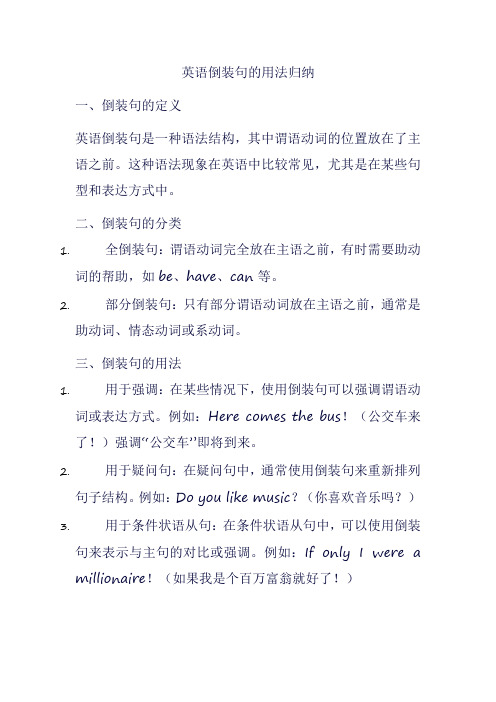
英语倒装句的用法归纳一、倒装句的定义英语倒装句是一种语法结构,其中谓语动词的位置放在了主语之前。
这种语法现象在英语中比较常见,尤其是在某些句型和表达方式中。
二、倒装句的分类1.全倒装句:谓语动词完全放在主语之前,有时需要助动词的帮助,如be、have、can等。
2.部分倒装句:只有部分谓语动词放在主语之前,通常是助动词、情态动词或系动词。
三、倒装句的用法1.用于强调:在某些情况下,使用倒装句可以强调谓语动词或表达方式。
例如:Here comes the bus!(公交车来了!)强调“公交车”即将到来。
2.用于疑问句:在疑问句中,通常使用倒装句来重新排列句子结构。
例如:Do you like music?(你喜欢音乐吗?)3.用于条件状语从句:在条件状语从句中,可以使用倒装句来表示与主句的对比或强调。
例如:If only I were a millionaire!(如果我是个百万富翁就好了!)4.用于让步状语从句:在让步状语从句中,可以使用倒装句来表示转折关系。
例如:Try to find a way to solve the problem!(试着找到解决问题的方法!)5.用于虚拟语气:在虚拟语气中,可以使用倒装句来表示与实际情况相反的情况。
例如:If I were you,I would go to the party.(如果我是你,我会去参加派对。
)6.用于某些固定句型:有些固定句型要求使用倒装句。
例如:“Hardly had she sat down when the phone rang.”(她刚坐下电话就响了。
)7.表示惊讶、感叹、讽刺等情绪时也可以使用倒装句。
例如:How could you do such a thing!(你怎么能做出这种事!)四、倒装句的用法归纳总结1.英语倒装句是一种语法结构,主要有全倒装句和部分倒装句两种类型。
2.使用倒装句可以强调谓语动词或表达方式,也可以用于疑问句、条件状语从句、让步状语从句和虚拟语气等语法结构中。
英语倒装句12种类型
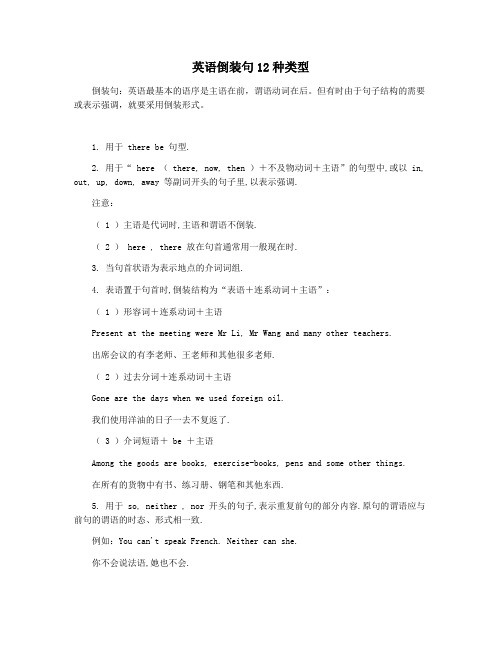
英语倒装句12种类型倒装句:英语最基本的语序是主语在前,谓语动词在后。
但有时由于句子结构的需要或表示强调,就要采用倒装形式。
1. 用于 there be 句型.2. 用于“ here ( there, now, then )+不及物动词+主语”的句型中,或以 in, out, up, down, away 等副词开头的句子里,以表示强调.注意:( 1 )主语是代词时,主语和谓语不倒装.( 2 ) here , there 放在句首通常用一般现在时.3. 当句首状语为表示地点的介词词组.4. 表语置于句首时,倒装结构为“表语+连系动词+主语”:( 1 )形容词+连系动词+主语Present at the meeting were Mr Li, Mr Wang and many other teachers.出席会议的有李老师、王老师和其他很多老师.( 2 )过去分词+连系动词+主语Gone are the days when we used foreign oil.我们使用洋油的日子一去不复返了.( 3 )介词短语+ be +主语Among the goods are books, exercise-books, pens and some other things.在所有的货物中有书、练习册、钢笔和其他东西.5. 用于 so, neither , nor 开头的句子,表示重复前句的部分内容.原句的谓语应与前句的谓语的时态、形式相一致.例如:You can't speak French. Neither can she.你不会说法语,她也不会.6. 为了保持句子平衡,或为了强调表语或状语,或是上下文紧密衔接时.例如: They arrived at a small village, in front of which was a big river.他们来到一个小村庄,村庄前面是条大河.1. 否定副词位于句首时的倒装在正式文体中,never, seldom, rarely, little, hardly, scarcely, no sooner, no longer, nowhere 等含有否定意义的副词若位于句首,则其后要用部分倒装:I shall never forgive him. / Never shall I forgive him. 我永远不会宽恕他。
英语倒装句结构

英语倒装句结构英语句子表达的基本语序是“主语+谓语”。
但在实际应用中,因语法结构的需要,或是为了强调,常把谓语移到主语之前,称为倒装。
英语的倒装结构有两种,其中较为常见的是部分倒装,即谓语的一部分移到主语之前。
如:Only when the war was over could he begin to work again.只有在战争结束后他才能够重新开始工作。
另一种倒装是完全倒装结构,即把谓语的全部都移到主语之前。
如:1.Here comes the bus.公共汽车来了。
2.“But what the child said is true.” said the father.“可是孩子的话是对的。
”父亲说。
下面详细归纳几种常用的倒装结构。
1、几种常见的部分倒装布局:1.Only+状语或者状语从句放在句首。
如:Only in this way can we improve our English.只有这样,我们才能提高英语水平。
Only after you left did l find this bag.只是在你分开当前我才发觉这只提包。
2.含否定意义并修饰全句的词放在句首。
如:not,little, hardly, scarcely,no more, no longer, in no way, never, seldom, not only, no sooner等等。
如:1)Seldom do I go to work by bus.我很少乘大众汽车上班。
2)Never shall I forget it.我永久不会遗忘这件事。
3)No sooner had I got home than it began to rain.我刚一到家,天就开始下雨。
3.So放在句首,跟在一个肯定句之后,表示前面所述内容也适用于另一人或物。
如:1)l XXX.我喜欢旅行,他也喜欢。
2)Her XXX.她父亲是位医生,她母亲也是。
高中英语知识点归纳倒装句的用法

高中英语知识点归纳倒装句的用法倒装句是英语中的一种常见语法现象,它与一般的语序有所不同。
在倒装句中,谓语动词不再位于句子的中间,而是移到主语之前或状语之前,这种语法结构的运用可以使句子显得更加生动有趣。
下面将对高中英语中常见的倒装句进行归纳总结。
一、完全倒装句完全倒装句是指将助动词、情态动词或系动词放在主语之前,句子的谓语动词则位于主语之后。
完全倒装句的结构为:助动词/情态动词/系动词+主语+谓语动词+其他。
1.助动词完全倒装句助动词包括be动词、have动词和do动词。
当句子以副词here、there或表示方向的副词(如up、down、in、out等)开头时,为了突出地点或方向,可以采用助动词完全倒装的形式。
例如:Here comes the bus.There is a cat under the table.Down came the rain.2.情态动词完全倒装句情态动词包括can、could、may、might、must、shall、should、will、would等。
在表示祝愿、建议、命令等意义时,可以采用完全倒装的形式。
例如:May you have a happy birthday!Should you need any help, feel free to ask.Will you please close the door?3.系动词完全倒装句系动词包括be动词、seem、appear、look、sound等。
在表示位置、方式、状态、主语特征等方面时,可以采用系动词完全倒装的形式。
例如:On the table lies a book.How beautiful the flowers are!Tired as he was, he kept working.二、部分倒装句部分倒装句是指将谓语动词的一部分(通常是助动词或情态动词)与主语之间的位置对调,这种语法结构常见于否定句、选择疑问句和以感叹词开头的句子。
倒装句七种英语结构

倒装句七种英语结构
倒装句是英语语法中的一种特殊结构,常用于强调或表达语气的变化。
以下是七种常见的倒装句结构:
1. 完全倒装:主语与谓语的位置颠倒。
例如:Never have I seen such a beautiful sunset.
2. 部分倒装:将助动词或情态动词与主语的位置颠倒。
例如:Not only does he play basketball well, but he also excels in football.
3. 前置式倒装:将表示地点、时间、方向等的副词或短语放在句首并与谓语的位置颠倒。
例如:In the middle of the room stood
a big table.
4. 介词短语倒装:在表示地点、时间、原因等的介词短语前使用倒装结构。
例如:Under no circumstances should you give up your dream.
5. 句首副词倒装:将表示否定、频率、程度等的副词置于句首并与谓语的位置颠倒。
例如:Seldom have I seen such a beautiful painting.
6. 祈使句倒装:用于祈使句中,将动词与主语位置颠倒。
例如:Never mind, let's try again.
7. 条件句倒装:在条件句中,将“if”与主语的位置颠倒。
例如:Had I known the truth, I would not have gone there.
以上是七种常见的倒装句结构,掌握它们能够更加灵活地运用英
语语法,使语言表达更加生动有力。
英语倒装金句100句

英语倒装金句100句英语中的倒装句是一种常用的表达方式,它能够使句子更加生动有力。
本文将为您介绍100个常用的英语倒装金句,欢迎阅读。
1. Hardly had I arrived at the station when the train departed.2. Never have I seen such a beautiful sunset.3. Not until she left did I realize how much I missed her.4. Only in this way can we solve the problem effectively.5. Little did he know that his life was about to change forever.6. Under no circumstances should you give up on your dreams.7. Seldom does he express his emotions openly.8. Rarely have I encountered such a challenging task.9. No sooner had the teacher finished speaking than the bell rang.10. In no way am I suggesting that we should ignore the issue.11. At no time during the experiment did the machine malfunction.12. Never before have I felt so alive.13. Only when we are willing to change can we grow.14. Little do they realize the impact of their actions.15. Under no condition should you disclose the confidential information.16. Seldom have I witnessed such dedication and perseverance.17. Rarely do I find the time to relax and enjoy a good book.18. Not until recently did I discover my true passion.19. Only by working together can we achieve our goals.20. Hardly had I begun to speak when she interrupted me.21. Never have I encountered such a difficult problem before.22. Not until tomorrow will they be able to complete the project.23. Only in his presence do I feel truly at ease.24. Little did she suspect that her life was about to change forever.25. Under no circumstances should you give up on your dreams.26. Seldom does he admit that he is wrong.27. Rarely have I seen such a beautiful landscape.28. No sooner had I finished my work than the phone rang.29. In no way am I suggesting that we should ignore the issue.30. At no time during the performance did the audience grow bored.31. Never before have I encountered such a kind-hearted person.32. Only when we face our fears can we overcome them.33. Little do they realize the impact of their words.34. Under no condition should you reveal the password to anyone.35. Seldom have I experienced such a sense of accomplishment.36. Rarely do I have the opportunity to travel abroad.37. Not until he apologized did I forgive him.38. Only by following these steps can you achieve success.39. Hardly had we arrived at the airport when the flight was canceled.40. Never have I seen such a breathtaking view.41. Not until the last moment did she make up her mind.42. Only with your support can we make a difference.43. Little did they know that their lives were about to change forever.44. Under no circumstances should you compromise your values.45. Seldom does he ask for help when he needs it.46. Rarely have I encountered such a challenging task.47. No sooner had I left the house than it started to rain.48. In no way am I suggesting that we should give up.49. At no time during the meeting did the discussion become heated.50. Never before have I felt so inspired.51. Only when we take risks can we achieve great things.52. Little do they understand the complexity of the situation.53. Under no condition should you reveal your personal information.54. Seldom have I encountered such a generous offer.55. Rarely do I have the opportunity to meet such interesting people.56. Not until yesterday did I realize the importance of communication.57. Only by working together can we solve this problem.58. Hardly had I finished my meal when the phone rang.59. Never have I witnessed such dedication.60. Not until the last minute did he change his mind.61. Only through hard work can we achieve our goals.62. Little did she know that her life was about to change forever.63. Under no circumstances should you give up on your dreams.64. Seldom does he talk about his personal life.65. Rarely have I seen such a beautiful sight.66. No sooner had I arrived at the station than the train left.67. In no way am I suggesting that we should ignore the problem.68. At no time during the interview did he mention his previous experience.69. Never before have I felt so inspired.70. Only when we face our fears can we overcome them.71. Little do they realize the impact of their actions.72. Under no condition should you reveal your password.73. Seldom have I witnessed such determination.74. Rarely do I have the opportunity to travel.75. Not until she left did I realize how much I missed her.76. Only by working together can we find a solution.77. Hardly had I finished my work when the power went out.78. Never have I been so impressed by someone's talent.79. Not until the last minute did she decide to go.80. Only with your help can we make a difference.81. Little did they suspect that their lives were about to change forever.82. Under no circumstances should you give up on your dreams.83. Seldom does he take the time to appreciate the beauty around him.84. Rarely have I seen such dedication and commitment.85. No sooner had I started reading the book than I was hooked.86. In no way am I suggesting that we should abandon our principles.87. At no time during the concert did the audience grow bored.88. Never before have I felt so alive.89. Only when we step out of our comfort zone can we grow.90. Little do they realize the impact of their choices.91. Under no condition should you share your passwords with others.92. Seldom have I encountered such a challenging task.93. Rarely do I have the opportunity to meet such interesting people.94. Not until yesterday did I realize how much I loved him.95. Only by working together can we achieve success.96. Hardly had I begun my presentation when the fire alarm went off.97. Never have I seen such a magnificent sight.98. Not until the last moment did she reveal her true feelings.99. Only in this way can we make a difference.100. Little did they know that their lives were about to change forever.以上便是100个常用的英语倒装句金句,它们能够让您的英语表达更加生动有力。
高中英语知识点归纳倒装句的用法及常见情况

高中英语知识点归纳倒装句的用法及常见情况倒装句是英语语法中一个重要的句法结构,它在句子中有特殊的应用。
本文将归纳总结高中英语中关于倒装句的用法及常见情况,以帮助大家更好地理解和运用倒装句。
一、倒装句的基本用法倒装句是指把原本主语和谓语的次序颠倒,使谓语动词或助动词出现在主语之前的一种句法结构。
在英语中,倒装句主要有三种基本形式:全部倒装、部分倒装和助动词倒装。
1. 全部倒装全部倒装是指将整个谓语部分完全颠倒,即将谓语动词或助动词放在主语之前。
常见情况有:在以否定词开头的句子中,当否定副词not,never,hardly,scarcely,little等放在句首时;以及在表示地点、时间或方式的状语从句中。
例1:Not only does he speak English fluently, but he also speaks French.例2:Hardly had I arrived home when it started to rain.例3:In the garden were some beautiful flowers.2. 部分倒装部分倒装是指将助动词,或情态动词,或谓语动词的某些形式移到主语之前。
常见情况包括:带有否定意义的词或短语出现在句首时;含有表示条件的副词或介词短语的句子;以及为了强调某一部分内容。
例4:Never have I seen such a beautiful sunset.例5:Had I known the truth, I would not have told her.例6:Only in this way can we achieve success in our study.3. 助动词倒装助动词倒装是指将助动词提到主语之前,用于疑问句或以so/neither/nor开头的句子,其目的是避免重复。
例7:Do you know him? —— No, I don't.例8:She is reading a book, and so am I.例9:He doesn't like ice cream, and neither do I.二、倒装句的常见情况除了基本的倒装句形式外,倒装句还有一些常见的情况和特殊用法需要掌握。
英语倒装句的九种分类讲解

英语倒装句的九种分类讲解为了强调或平衡句子结构,英语中常用倒装;倒装有全部倒装和部分倒装;全部倒装是指将句子中的谓语动词全部置于主语之前;部分倒装是指将谓语的一部分如助动词或情态动词置于主语之前;如果句中的谓语没有助动词或情态动词,则需添加助动词do,does或did等,并将其置于主语之前;现将倒装句分类讲解如下:1. 以here,there,now,then等地点或时间副词开头的句子,谓语动词是be, co me, go, remain等,而主语又是名词时,用全部倒装;注意:如果句子的主语是代词时,则不倒装;如:Here comes the bus/ Here it comes2. 有些动词与副词out,in,up,down,away等构成不及物动词短语;为了使句子更生动,常将这些副词提前到句首,这时用全部倒装;注意:句子的主语是代词时,则不倒装;如:Up went the rocket. / Up it went.3. 将表示地点的介词短语放在句首进行强调时,使用全部倒装;谓语动词常为不及物动词;如: From the window came the sound of music.4. 当句子主语部分较长,谓语部分较短,或为了强调句子的表语时,常使用全部倒装;句子的结构为“表语+系动词+主语”;如: Gone are the days when we had nothing to eat.5. if虚拟条件状语从句中,如果将连词if省略,需用部分倒装;如:Were I yo u, I would go there.6. as引导的让步状语从句的倒装有如下几种形式:1 从句的谓语部分为“不及物动词+副词”时,常将此副词提前到从句句首;如:Hard as you try, you will not succeed.2 从句的谓语部分为“情态动词+不及物动词”时,常将此动词提前到从句句首;如: Wait as you may, he will not see you.3 从句的谓语部分是“系动词+形容词”时,常将此表语形容词提前到从句句首;如: Proud as the nobles are, they are afraid to see me.4 从句的谓语部分是“系动词+单数名词”时,则常将这个表语提前,但要省略名词前的不定冠词;如: Child as he is, he can tell right from wrong.7. 具有半否定意义的词或短语位于句首时,用部分倒装;如:seldom, rarely, not, never, by no means, in no time, hardly...when, no sooner...than, n ot only...but also等;如: Not only does he do well in his lessons, but a lso he often helps others with their lessons.8. “only+状语”位于句首时, 用部分倒装;如:Only then did I know the importance of English.9. so...that结构中,有时要强调so所修饰的形容词或副词,常将so 连同它所修饰的形容词或副词一起提前放在句首;如: So bright was the moon that th e flowers seem as bright as by day.英语语法倒装句之部分倒装部分倒装是指将谓语的一部分如助动词或情态倒装至主语之前;如果句中的谓语没有助动词或情态动词,则需添加助动词do, does或did,并将其置于主语之前;1 句首为否定或半否定的词语,如no, not, never, seldom, little, hardly, at no time, in no way, not until… 等;Never have I seen such a performance.Nowhere will you find the answer to this question.Not until the child fell asleep did the mother leave the room.当Not until引出主从复合句,主句倒装,从句不倒装;注意:如否定词不在句首不倒装;I have never seen such a performance.The mother didn't leave the room until the child fell asleep.典型例题1 Why can't I smoke hereAt no time___ in the meeting-roomA. is smoking permittedB. smoking is permittedC. smoking is it permittedD. does smoking permit答案A. 这是一个倒装问题;当否定词语置于句首以表示强调时,其句中的主谓须用倒装结构; 这些否定词包括no, little, hardly, seldom, never, not only, not until等;本题的正常语序是 Smoking is permitted in the meeting-room at no time.2 Not until the early years of the 19th century ___ what heat is.A. man did knowB. man knowC. didn't man knowD. did man know 答案D. 看到Not until…的句型,我们知道为一倒装句,答案在C,D 中选一个; 改写为正常语序为,Man did not know what heat is until the early years o f the 19th. 现在将not提前,后面就不能再用否定了,否则意思就变了;倒装句讲解和练习英语句子通常有两种语序:一种主语在前,谓语在后,称为自然语序,另一种谓语在前,主语在后,称为倒装语序按“主语+ 谓语” 这种顺序排列的句子是陈述语序;如果排列顺序变为“谓语或谓语一部分+主语”,就是倒装;倒装句分为:一、部分倒装就是把谓语中的be动词、助动词或情态动词置于主语前面;常见于下列几种情况:一. only所修饰的副词,介词短语或状语从句放在句首时,要用:only+ 状语+ be /助动词/情态动词+主语及其他Only when he told me the news did I know what had happened.Only in this way can you make progress in your Eng lish.注意:only修饰主语时,不需要倒装;in this way ________to make improvement in the op erating system.A. you can hopeB. you did hopeC. can you hopeD. did you hope二.含有否定意义的副词或连词放在句首时;如:never, l ittle, seldom, not, not only, not until, no sooner …than, hardly …when, rarely, scarcely, in no way等;We seldom get up at four in the morning.= Seldom do we get up at four in the morning.Not a single word from him could the enemy drag.Rarely have I heard of such a silly thing.1hardly…when; scarcely…when…; no sooner…than…可以用正常语序 had hardly done when… did 或用倒装句式Hardly had + 主语+ done when… did 句式;hardly所在的句子用过去完成时;The bell hardly had rung when the class began.= Ha rdly had the bell rung when the class began.No sooner had he arrived in Beijing than he began to work.2not only… but also 如连接两个成分时,不用倒装;连接句子时, 前面的句子要用倒装;Not only was everything that he had taken away fro m him, but also his German citizenship.Not only is he busy, but also I have a lot of work to do.Not only does he speak English very well, but also he speaks French well.2.I finally got the work I dreamed about. Never i n all my life________ so happyA. did I feelB. I feltC. I had feltD. had I fel t3.Not until I began to work ________how much time I had wasted.A. didn't I realizeB. did I realizeC. I didn't r ealizeD. I realized4.No sooner___ than it began to rain heavily.A. the game beganB. has the game begunC. did the game beginD. had the game begun三.在so…that, such…that句型中,若把so, such引导的结构放在句首时;So frightened was he that he did not dare to move an inch.5.So difficult _____it to live in an English-spea king country that I was determined to learn English well.A. I've felt B have I felt C. I did feel D. did I feel四.省略了if的虚拟条件句中,把were, had或should放在句首时;If I were you, I would take the job. = Were I you, I would take the job.6.________it rain tomorrow, we would have to put off the visit to Yangpu Bridge.A. WereB. ShouldC. WouldD. Will五.把副词so放在句首,表示前面所说的情况也适用于另一个人或物;I like reading English, so does he.六.把neither, nor放在句首,表示前面的否定内容也适用于另一个人或物;If you won't go, neither will I.don't think I can walk any further.-________, let's stop here for a rest.A. Neither and IB. Neither can IC. I don't think soD. I think so七用于形容词/副词/名词/动词+as though引导的让步状语从句中;注意:当表语为名词时,则名词前不加任何冠词;主谓并不倒装;Try hard as he will, he never seems able to do the work satisfactorily.Child as he is, he knows a lot.8.________, I have never seen anyone who's as cap able as John.A. As long as I have traveledB. Now that I have traveled so muchC. Much as I have traveledD. As I have traveled so much八.由however, no matter how引导的让步状语从句中,把however+形容词/副词,no matter how+形容词/副词放在句首时;9.________, mother will wait for him to have dinn er together.A. However late is heB. However he is lateC. However is he lateD. However late he is二、全部倒装就是把整个谓语部分放在主语之前;注意:谓语动词的数要与后面的主语保持一致;常见于几种情况:一.用于地点副词here, there,方位副词out, in, up, d own及时间副词now, then等开头的句子里,以示强调;There goe s the bell.Look Here they come.这种倒装要求:主语必须是名词;主语是人称代词时,主语和谓语语序不变;Here it is.Away he went.这类倒装句式一般只用一般现在时和一般过去时;Here comes the bus.Out rushed the boys.二.当表示地点的介词短语放句首时;注意:谓语多为be, lie, sit, stand, come, w alk等不及物动词;倒装时不需要助动词;Under the table are three white cats.In front of the tower flews a stream.10.Under a big tree ________, half asleep.A. did sat a fat manB. a fat man satC. did a fat man satD. sat a fat man三there放在句首时,要用倒装句式;在“there + be”结构中的谓语动词有时不用be , 而用表示类似“存在”观念的其他不及物动词;如:live, stand, come, lie, flow, enter, rise 和appear等;There came shouts for help from the river.There lies a large wheat field in front of the house.Many years ago there lived an old man in the wooden house.四.表语置于句首时,倒装结构为"表语+系动词+主语";1形容词+系动词+主语Present at the meeting was Mr. Green, a headmaster.2过去分词+系动词+主语Hidden behind the door were some naughty children.Gone forever are the days when the Chinese people had to use foreign oil.3介词短语+系动词+主语In front of the playground is a newly-built house.五.有时由于主语较长,谓语很短,为保持句子平衡,或为了强调表语或状语,或使上下文紧密衔接时;They arrived at a house, in front of which sat an old man.六.在一些表示祝愿的句子里;Long live the Communist Party of ChinaMay you all be happy.答案 1—5 CDBDD 6—10 BBCDD巩固练习and caught the mouse.A. Up the cat jumpedB. The cat up jumpedC. Up jumped the catD. Jumped up the catand the lesson began.A. In came Mr BrownB. Mr Brown in cameC. In came heD. came in Mr Brown3. Over _______ , dead.A. rolling the goatB. rolled the goatC. did the goat rollD. the goat rolled4.—Where is my shirt, mum—_________.A. There is itB. There it isC. There isD. Here is it5. —Where is your father—Oh, ________.A. here he comesB. he here comesC. here does he comeD. here comes he6. The door opened and there ________ .A. enters an old manB. entered an old manC. did an old man enterD. an old man entered7. Now ______ your turn to recite the text.A. will comeB. comesC. has comeD. there is8. Often _____ them not to smoke here.A. we advisedB. advised meC. did we adviseD. had we advisedplaying soldiers.A. Inside the room were two boysB. Inside the room two boysC. Were two boys inside the roomD. Inside the room was two boys10. On the wall _______ two large portraits.A. are hangingB. hangedC. hangD. hangswho was wounded in the stomach.A. Among them were a soldierB. Among them was a soldierC. Among them a soldier wasD. Among they was a soldier12. Next door to ours ________ , who is no less than eighty.A. that lives an old manB. does an old man liveC. lives an old manD. where lives an old manplays the piano very well, ______.A. so every one of us doesB. every one of us doesC. so does every one ofusD. so do every one of ussay he works hard, ______, and _____.A. so he does; so you doB. so he does; so do youC. so does he; so do youD. so does he; so you do15. —I thought you women were present at the meeting.—__________.A. So we wereB. So we didC. So were weD. So did wedon’t think Jack will come today, _____.A. nor will MaryB. and Mary doesn’tC. Mary will eitherD. or Mary does17. She is fond of cooking, _____I .A. so amB. nor amC. neither doD. nor dowas born in Germany and German was his native language .A. So it was with AnglesB. So was it with AnglesC. So was AnglesD. So did Anglesfish needs water and without water it will .A. So does a manB. So will a manC. So it is with a manD. So is it with a man20. So absorbed _______ the work that she often forgot to _____ her meals.A. had she been in; doB. she was in; makeC. was she in; takeD. she had been in ; haveloudly ______ that every one of the class could hear him.A. did he speakB. did he spokeC. spoke heD. he spoke22. __________ his appearance that no one could recognize him.A. Strange so wasB. So strange wasC. Was so strangeD. So was strangeonce ______ their plan.A. did they changeB. they changedC. changed theyD. they did change24. Never ______ such a wonderful place as Hangzhou.A. are seeingB. had I seenC. I have seenD. have I seen______ TV during the day.A. they watchB. are they watchingC. have they watchedD. do they watch______ as in my garden.A. the flowers were so beautifulB. were the flowers so beautifulC. so beautiful were the flowersD. so beautiful the flowers were27. Hardly ________ his homework when he went out.A. finished heB. he had finishedC. did he finishD. had he finished_____ finished their homework ______ I came into the classroom.A. had they; than B. they had; whenC. had they; when D. did they; when29. Not only _______ a promise, but als o he kept it.A. has he made B. does he makeC. he made D. did he make30. Not until his comra des criticized him _______ to admit his mistake.A. had he begun B. began heC. did he begin D. doe s he begin答案 1—5 CABBA 6—10 BBBDA 11—15 BCCBA 16—20 BAACC 21—25 ABADD 26—30 BDCDC。
倒装句的形式和用法

倒装句的形式和用法倒装句是英语语法中常见的句子结构,主语与谓语动词的次序颠倒。
它在英语中具有一定的运用频率,常见于问句、条件句、方位表达等情景。
本文将深入探讨倒装句的形式和用法,以帮助读者更好地理解和掌握倒装句结构。
一、完全倒装句的形式完全倒装句是最常见的倒装句形式。
在完全倒装句中,谓语动词位于主语之前。
1. 在问句中“Where do you live?”(你住在哪里?)→ “Where live you?”(你住在哪里?)2. 在以介词短语开头的句子中“In the garden stood a beautiful flower.”(花园里有一朵美丽的花。
)→ “A beautiful flower stood in the garden.”(花园里有一朵美丽的花。
)3. 在以表示地点的状语或副词开头的句子中“Here comes the bus.”(汽车来了。
)→ “The bus comes here.”(汽车来了。
)二、部分倒装句的形式部分倒装句是指只将助动词、系动词或情态动词置于主语之前。
1. 在条件句中“If I were you, I would study harder.”(要是我是你,我会更加努力学习。
)→ “Were I you, I would study harder.”(要是我是你,我会更加努力学习。
)2. 在以“only”开头的句子中“Only by working hard can you achieve success.”(只有努力工作,你才能获得成功。
)→ “Only by working hard can you achieve success.”(只有努力工作,你才能获得成功。
)三、倒装句的用法1. 在强调句中“Jane has never been to Paris.”(简从未去过巴黎。
)→ “Never has Jane been to Paris.”(简从未去过巴黎。
语法中的倒装句用法详解

语法中的倒装句用法详解倒装句是英语语法中常见的一种句型,它在句子结构和语序上与一般句子相比有所不同。
倒装句的用法多样,包括完全倒装句、部分倒装句和条件状语从句中的倒装句等。
本文将详细解释倒装句的用法及其相关规则,并引用示例句子加以说明。
一、完全倒装句完全倒装句是指将助动词或情态动词放在句首,主语紧随其后,动词短语(或谓语)置于主语之后。
完全倒装句的常见情况有以下几种:1. 当表示地点或方向的副词置于句首时:例句:Up the hill ran the little boy.(小男孩跑上了山坡。
)例句:Here comes the bus.(车来了。
)例句:Out rushed the crowd when the door opened.(门一开,人群冲了出去。
)2. 当表示时间的副词或短语置于句首时:例句:Yesterday was I absent from school.(昨天我没去上学。
)例句:In a few minutes will the ceremony begin.(几分钟后,典礼将开始。
)例句:At the age of ten did he start learning the piano.(十岁时他开始学钢琴。
)3. 当以“here”或“there”开头时:例句:Here comes the bride.(新娘来啦。
)例句:There goes the alarm.(警报响了。
)例句:There hides a treasure in the cave.(洞里藏着一处宝藏。
)二、部分倒装句部分倒装句是指将助动词、情态动词或谓语动词的某些形式放在句首,主语置于动词之后,另一部分谓语成分仍位于句尾。
部分倒装句的常见情况如下:1. 在问句中:例句:Do you speak English?(你会讲英语吗?)例句:Have you finished your homework?(你完成作业了吗?)例句:Can he swim?(他会游泳吗?)2. 在以“never”、“seldom”、“rarely”、“not until”等否定副词或短语开头的句子中:例句:Never have I seen such a beautiful sunset.(我从未见过如此美丽的日落。
英语倒装句12种类型
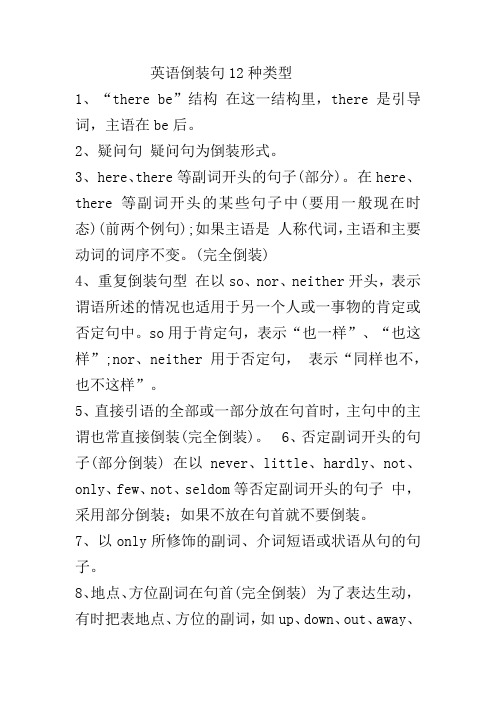
英语倒装句12种类型1、“there be”结构在这一结构里,there是引导词,主语在be后。
2、疑问句疑问句为倒装形式。
3、here、there等副词开头的句子(部分)。
在here、there等副词开头的某些句子中(要用一般现在时态)(前两个例句);如果主语是人称代词,主语和主要动词的词序不变。
(完全倒装)4、重复倒装句型在以so、nor、neither开头,表示谓语所述的情况也适用于另一个人或一事物的肯定或否定句中。
so用于肯定句,表示“也一样”、“也这样”;nor、neither用于否定句,表示“同样也不,也不这样”。
5、直接引语的全部或一部分放在句首时,主句中的主谓也常直接倒装(完全倒装)。
6、否定副词开头的句子(部分倒装) 在以never、little、hardly、not、only、few、not、seldom等否定副词开头的句子中,采用部分倒装;如果不放在句首就不要倒装。
7、以only所修饰的副词、介词短语或状语从句的句子。
8、地点、方位副词在句首(完全倒装) 为了表达生动,有时把表地点、方位的副词,如up、down、out、away、in等放在句首,同时把谓语动词放在主语之前。
若主语为人称代词,主语和谓语动词的位置不变,只将副词放在句首。
(完全倒装)9、虚拟结构中在虚拟结构中,条件从句的谓语含有were、had和should这三个词是,可省去if,将这些词移至主语之前。
10、as引导的让步状语从句 as引导让步状语从句时要倒装(形容词/副词/名词/动词+as+主语+谓语)。
11、祝愿的句子用于某些表示祝愿的句子里。
12、So+形容词、副词及such置于句首时。
英语的倒装句整理归纳

英语的倒装句整理归纳英语倒装句句型的结构有两种:部分倒装和完全倒装。
一、部分倒装部分倒装其实也很简单,我们只需要记住,它完全和疑问句结构一样,要把谓语的一部分(即系动词be;助动词do, have,be, will;情态动词can, must should等)提到主语之前。
Not only is he humorous, but he is also kind to the kids.他不仅幽默,而且对孩子们也很好。
Seldom does the boy eat lamb.这个男孩很少吃羊肉。
Little can we do to help the poor man.我们帮不了这个可怜的人。
部分倒装具体情况:1,否定词never及部分否定词rarely和seldom在句首:Never have I been felt so frustrated!我从来没有这么沮丧过!Seldom has she done anything more foolish.她很少干过比这更愚蠢的事。
注意,句子中往往是完成时态且可能含有比较级。
2,部分否定词hardly, barely, no sooner, or scarcely在句首:No sooner had she got in the bath than the doorbell rang.她刚开始洗澡,门铃响了。
No sooner had we reach the bus station than the bus came.我们一到公共汽车站,公共汽车就来了。
Barely had I closed the door when the phone rang.我刚关上门,电话就响了。
注意,这类句子中一般有先后接连发生的两个动作。
所以从主句多用过去完成时。
3, 部分否定词Little在句首:Little have I read about archeology.我很少读考古学方面的东西。
【语法精讲】 英语倒装句总结,很全面!

语法精讲:英语倒装句总结倒装的种类英语最基本的词序是主语在谓语动词的前面。
如果将句子的主语和谓语完全颠倒过来,这称之为完全倒装。
如果只将助动词或情态动词移至主语之前,谓语的其他部分仍保留在主语的后面,这称之为部分倒装。
一.完全倒装完全倒装是将谓语的全部放在主语之前,此结构通常只用于一般现在时和一般过去时两种。
On her left sat her husband.她左边坐着她丈夫。
Here is the book you want.你要的书在这儿。
Down went the small boat.小船沉下去了。
二.部分倒装部分倒装是指将谓语的一部分,如助动词或情态动词,移至主语之前。
Only by working hard can one succeed.只有努力才能成功。
Never have I seen her before.我以前没见过她。
提示:如果句中的谓语没有助动词或情态动词,则需添加助动词do,does或did,并将其置于主语之前。
Well do I remember the day I joined the League.入团的那一天,我记忆犹新。
Little did I think that he could be back alive.我没有想到他竟能活着回来。
三.常见的倒装结构A.常见的完全倒装结构1.there be句型。
There is a mobile phone and some books on the desk.桌上有一个手机和一些书。
There are thousands of people gathering on the square.广场上聚集着成千上万的人。
注意:引导词there还可以接appear,exist,lie,remain,seem,stand,live等词。
There lived an old fisherman in the village.村里住着一位老渔夫。
英语倒装大全
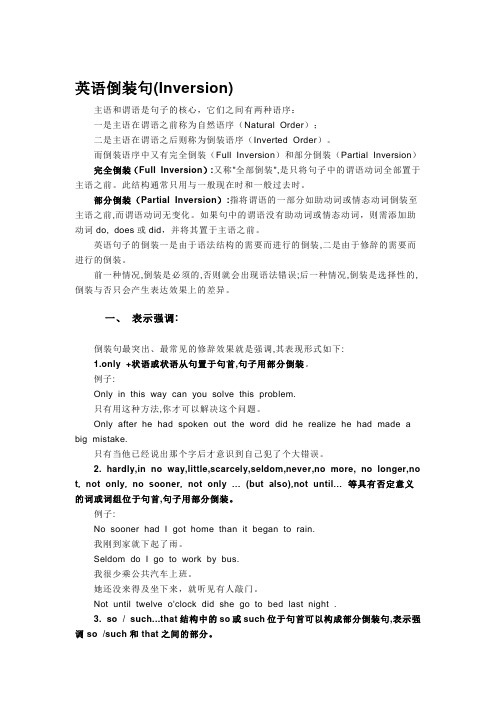
英语倒装句(Inversion)主语和谓语是句子的核心,它们之间有两种语序:一是主语在谓语之前称为自然语序(Natural Order);二是主语在谓语之后则称为倒装语序(Inverted Order)。
而倒装语序中又有完全倒装(Full Inversion)和部分倒装(Partial Inversion)完全倒装(Full Inversion):又称"全部倒装",是只将句子中的谓语动词全部置于主语之前。
此结构通常只用与一般现在时和一般过去时。
部分倒装(Partial Inversion):指将谓语的一部分如助动词或情态动词倒装至主语之前,而谓语动词无变化。
如果句中的谓语没有助动词或情态动词,则需添加助动词do, does或did,并将其置于主语之前。
英语句子的倒装一是由于语法结构的需要而进行的倒装,二是由于修辞的需要而进行的倒装。
前一种情况,倒装是必须的,否则就会出现语法错误;后一种情况,倒装是选择性的,倒装与否只会产生表达效果上的差异。
一、表示强调:倒装句最突出、最常见的修辞效果就是强调,其表现形式如下:1.only +状语或状语从句置于句首,句子用部分倒装。
例子:Only in this way can you solve this problem.只有用这种方法,你才可以解决这个问题。
Only after he had spoken out the word did he realize he had made a big mistake.只有当他已经说出那个字后才意识到自己犯了个大错误。
2. hardly,in no way,little,scarcely,seldom,never,no more, no longer,no t, not only, no sooner, not only … (but also),not until… 等具有否定意义的词或词组位于句首,句子用部分倒装。
英语中的倒装句结构有哪些

英语中的倒装句结构有哪些?在英语中,倒装句指的是将谓语动词或助动词置于主语之前的句子结构。
倒装句可以用于不同的语法结构和句型中。
下面是英语中常见的几种倒装句结构:1. 完全倒装句(Full Inversion):-以副词或介词短语开头的句子:Adverbial inversion- Never have I seen such a beautiful sunset.(我从未见过如此美丽的日落。
)- In the garden sat a little girl.(花园里坐着一个小女孩。
)-以表示否定的副词或短语开头的句子:Negative inversion- Not only did she pass the exam, but she also got the highest score.(她不仅通过了考试,而且还得到了最高分。
)- Under no circumstances should you give up.(无论如何,你都不应该放弃。
)-以表示条件的副词或短语开头的句子:Conditional inversion- Should you need any assistance, please let us know.(如果你需要任何帮助,请告诉我们。
)- Were he to win the lottery, he would buy a new car.(如果他中了彩票,他会买一辆新车。
)2. 部分倒装句(Partial Inversion):-以否定副词开头的句子:Negative adverbial inversion- Never have I been so insulted in my life.(我一生中从未受过如此侮辱。
)- Rarely do I go to bed before midnight.(我很少在午夜前上床睡觉。
)-以表示方向或地点的副词短语开头的句子:Adverbial phrase inversion- Up the hill ran the children.(孩子们跑上山。
- 1、下载文档前请自行甄别文档内容的完整性,平台不提供额外的编辑、内容补充、找答案等附加服务。
- 2、"仅部分预览"的文档,不可在线预览部分如存在完整性等问题,可反馈申请退款(可完整预览的文档不适用该条件!)。
- 3、如文档侵犯您的权益,请联系客服反馈,我们会尽快为您处理(人工客服工作时间:9:00-18:30)。
英语中的倒装句The Standardization Office was revised on the afternoon of December 13, 2020英语中的倒装句英语倒装的概念与分类英语句子的结构一般是“主语 + 谓语”,语法上称这种语序为自然语序。
但有时由于出于语法结构的需要或修辞的需要,常把句子中的一部分或全部倒转过来,这种语序就是语序。
英语的倒装分为部分倒装和完全倒装。
部分倒装指的是将谓语的一部分位于主语前,其句式与一般疑问句的相同。
如:She hardly has time to listen to music.=Hardly does she have time to listen to music.他几乎没时间听音乐。
完全倒装则指将谓语动词完全置于主语前。
完全倒装一般具有以下两个条件:①谓语动词是单个(即不带、助动词或be)的不及物动词,且只限于一般现在时或一般过去时。
②主语只能是名词。
Here comes the bus. 公共汽车来了。
Away went the runners. 赛跑选手们跑远了。
The door opened and in came Mr Smith. 门开了,史密斯先生进了来。
注:若主语为人称代词,则不能用倒装。
如:Away he went. 他跑远了几类常见的部分倒装句类型1. 否定型倒装在正式文体中,如果将never, seldom, rarely, little, hardly, scarcely, no sooner, no longer, nowhere 等含有否定意义的副词若位于句首,则其后的句子要用部分倒装。
如:后来我再也没见到过他了。
I never saw him again.→Never did I see him again.他很少出去吃饭。
He seldom goes out for dinner.→Seldom do es he go out for dinner.她几乎没时间听音乐。
She hardly has time to listen to music.→Hardly does she have time to listen to music.他几乎没有认识到他面临的危险。
He little realized the danger he faced.→Little did he realize the danger he faced.对于not…until句型,当not until…位于句首时,其后的主句要用倒装语序。
如:雨停了之后他才离开这房间。
He didn’t leave the room until the rain stopped.→Not until the rain stopped did he leave the room.某些起副词作用的介词短语,由于含有否定词,若位于句首,其后要用部分倒装。
如:On no accounts must this switch be touched. 这个开关是绝不能触摸的。
In [Under] no circumstances will I lend money to him.无论如何我也不会再借钱给他了。
2. only型倒装当一个状语受副词only的修饰且置于句首时,其后用部分倒装语序。
如:Only in this way can we learn English. 只有这样才能学会英语。
Only then did I understand what she meant. 只有到那时我才明白她的意思。
Only for the love of his family does he do such hard work. 只为了他对家庭的爱,他做这么辛苦的工作。
3. so型倒装当副词so后接形容词或副词位于句首时,其后通常用部分倒装。
如:So cold was the weather that we had to stay at home. 天气太冷,我们只好呆在家里。
So fast does light travel that we can hardly imagine its speed. 光速很快,我们几乎没法想象它的速度。
So sudden was the attack that we had no time to escape. 袭击来得非常突然,我们来不及逃跑。
以so开头的句子还有这样一种倒装——表示前面提出的某一肯定的情况也同样适合于后者,这类倒装的基本结构是“so+助动词+主语”。
如:You are young and so am I. 你年轻,我也年轻。
She likes music and so do I. 她喜欢音乐,我也喜欢。
If he can do it, so can I. 要是他能做此事,我也能。
4. not only型倒装当not only…but also位于句首引出句子时,not only 后的句子通常用部分倒装形式。
如:Not only is he a teacher, but he is also a poet. 他不仅是一位教师,而且是一位诗人。
Not only did he speak more correctly, but he spoke more easily. 不仅他讲得更正确,也讲得更不费劲了。
5. may用来表示祝愿时,一般用部分倒装。
如:May you have a good journey. 祝你旅途愉快。
May you succeed. 祝你成功。
完全倒装的四种类型完全倒装的基本形式是“谓语+主语”,主要涉及以下几种类型:一、here类当表示地点的here和 there位于句首时,其后用完全倒装形式。
这类倒装句的谓语通常是动词be和come, go等表示移动或动态的不及物动词。
如:Here’s Tom. 汤姆在这里。
There’s Jim. 吉姆在那儿。
Here comes the bus. 公共汽车来了。
There goes the bell. 铃响了。
There goes the last train. 最后一班火车开走了。
这类倒装句的主语只能是名词,若主语为代词,则不能倒装。
如:Here it comes. 它来了。
二、away类副词away, down, in, off, out, over, round, up 等位于句首时,其后也用完全倒装语序。
这类倒装句的谓语通常表示动态的不及物动词。
如:Away went the runners. 赛跑选手们跑远了。
Round and round flew the plane. 飞机盘旋着。
The door opened and in came Mr Smith. 门开了,史密斯先生进了来。
Down came the rain and up went the umbrellas. 下雨了,伞都撑起来了。
这类倒装句的主语也只能是名词,若主语为代词,则不用倒装。
如:Away he went. 他跑远了。
Down it came. 它掉了下来。
三、状语或表语类为了保持句子平衡或使上下文衔接紧密,有时可将状语或表语置于句首,句中主语和谓语完全倒装。
如:Among these people was his friend Jim. 他的朋友吉姆就在这些人当中。
By the window sat a young man with a magazine in his hand. 窗户边坐着一个年轻人,手里拿着一本杂志。
在表语置于句首的这类中,要注意其中的谓语应与其后的主语保持一致,而不是与位于句首的表语保持一致。
比较:In the box was a cat. 箱子里是一只猫。
In the box were some cats. 箱子里是一些猫。
四、非谓语动词类有时为了强调,可将谓语部分的现在分词、过去分词或不定式置于句首,从而构成。
如:Standing beside the table was his wife. 站在桌旁的是他的妻子。
Buried in the sands was an ancient village. 一个古老的村庄被埋在这沙土之中。
To be carefully considered are the following questions. 下列问题要仔细考虑。
So do I 与 So I do1.表示前面所述的情况也适合于后面一个人或事物,通常在so后用(部分倒装——用的形式)。
如:He likes English. So do I. 他喜欢英语,我也一样。
He was ill and so were his parents. 他病了,他父母也病了。
顺便说一句,在中,as也可这样用。
如:He travelled a great deal, as did most of his friends. 他去过许多地方旅游,他多数朋友也一样。
但是如果前面所述情况为否定式,则用neither, nor引出倒装句(此时不能用so)。
如:He couldn’t do it, and neither could she.他做不了,她也做不了。
He never comes late. Nor do I. 他从不迟到,我也从不迟到。
2.后一句子若只是重复前句的意思,起加强语气的作用,so后面不用。
如:—He has done a good job. 他干得不错。
—So he has. 他的确干得不错。
